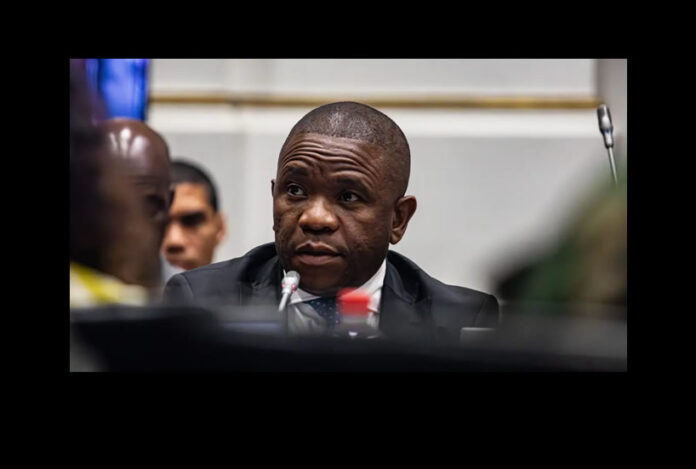KZN Police Chief Casts Doubt on Mchunu's Authorship of Disbanded Task Team Letter
Cape Town – KwaZulu-Natal provincial police commissioner Lt-Gen Nhlanhla Mkhwanazi has voiced his strong belief that suspended police minister Senzo Mchunu was not the true author of the letter that led to the disbandment of the political killings task team (PKTT), saying he believes the document was drafted elsewhere and merely signed by the minister.
Testifying for a second day before Parliament’s ad-hoc committee investigating allegations of corruption and interference within the criminal justice system, Mkhwanazi said the December 2024 letter—allegedly written by Mchunu—declared that the PKTT’s services were “no longer required” as it was of “no value in fighting crime.”
“I strongly believe that what is contained in the letter is not the minister’s words. I strongly believe that,” Mkhwanazi told MPs. “If the minister was honest, he would say, ‘Someone made me sign this, I did not write it myself.’”
The commissioner said he and National Police Commissioner General Fannie Masemola were excluded from consultations before the decision to disband the task team was taken.
“I was not invited to engage with him and later, I learnt that the national commissioner himself also did not talk to him and neither did General [Dumisani] Khumalo,” Mkhwanazi explained. “But when you read what the minister is saying in this letter, he has been briefed. So when the minister is being briefed it simply says someone told the minister that this team must be disestablished, and I believe someone drafted that letter.”
Mkhwanazi said the minister’s chief of staff, Cedrick Nkabinde, had indicated to him that the letter “had been going back and forth” between various people before being finalised, which further convinced him that Mchunu was not its true author.
“When chief of staff Nkabinde says to me the letter has been going back and forth [between different people], it made me believe he [Nkabinde] was a facilitator of this letter coming from somewhere being drafted to the minister for signature and back corrected. I don’t think he [Mchunu] is the author,” he said.
The controversial disbandment of the PKTT has been widely criticised, particularly because the unit was central to investigating politically motivated killings in KwaZulu-Natal—a province long plagued by assassination-style murders linked to political and tender-related rivalries.
During earlier testimony before the Madlanga Commission, national commissioner Masemola alleged that the disbandment was designed to protect murder-accused tenderpreneur Vusumuzi “Cat” Matlala, who had recently been arrested. Matlala is alleged to have links to senior police official General Sibiya and a well-connected fixer, Brown Mogotsi, who is said to have ties with Mchunu.
Mkhwanazi’s testimony on Tuesday added further weight to suspicions that external interference may have influenced the decision to shut down the task team.
He told the committee that he had evidence showing that certain junior officers were in direct communication with members of the executive branch about how to “manage” the national police commissioner.
“You will have a Gen Sibiya sending a WhatsApp message to the deputy minister,” Mkhwanazi revealed. “I don’t know who the deputy minister is. I am still investigating that part, but he will send that message and tell the deputy minister and make suggestions that ‘deputy minister, you must hold the national commissioner accountable.’”
The commissioner’s statements paint a troubling picture of possible political manipulation and interference within the upper echelons of law enforcement. His testimony comes amid growing scrutiny over the relationship between political leaders and senior police officials, particularly in light of the Madlanga Commission’s ongoing revelations about corruption, influence, and internal power struggles within the police service.
The Political Killings Task Team was established to address a surge in politically motivated assassinations in KwaZulu-Natal, particularly within the ANC. Its disbandment in late 2024 drew sharp criticism from civil society and opposition parties, who accused the government of attempting to stifle investigations that could implicate powerful figures.
Mkhwanazi’s suggestion that the minister’s letter was drafted and circulated by intermediaries raises new questions about who may have influenced the decision. His comments also hint at a deeper crisis within the police hierarchy—where loyalties appear divided and operational decisions may be swayed by political considerations rather than public safety.
The ad-hoc committee inquiry, chaired by senior MPs, is expected to call further witnesses in the coming weeks, including senior officials who were copied in the disputed letter. The committee’s findings could have far-reaching implications for both the suspended minister and the credibility of the police service as a whole.
As Mkhwanazi concluded his testimony, he reiterated that he stood by his belief that the letter did not originate from Mchunu himself. “I strongly believe that what is contained in the letter is not the minister’s words,” he repeated. “Someone made him sign it.”
The inquiry continues this week as Parliament seeks to uncover who truly ordered the disbandment of one of South Africa’s most crucial investigative units.

Follow Us on Twitter











